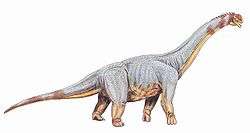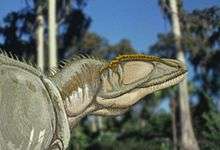Bahariya Formation
| Bahariya Formation Stratigraphic range: Lower Cenomanian[1] | |
|---|---|
| Type | Geological formation |
| Underlies | El Heiz Formation |
| Thickness | ~100m |
| Lithology | |
| Primary | sandstone |
| Other | mudstone, siltstone |
| Location | |
| Region | Western Desert |
| Country | Egypt |
| Type section | |
| Named for | Bahariya Oasis |
| Named by | Said 1962 |
The Bahariya Formation (Baharija Formation) is a fossil bearing geologic formation dating back to the Early Cenomanian, which outcrops within the Bahariya depression, and is known from oil exploration drilling across much of the Western Desert where it forms an important oil reservoir.[1][2][3]
Extent

The Bahariya Formation forms the base of the depression, the lower part of the enclosing escarpment and all of the small hills within.[4] The type section for the formation is found at Gebel El-Dist, a hill at the northern end of the Bahariya depression.[5]
Stratigraphy and sedimentology
Four depositional sequences have been recognised in the Bahariya Formation in the Bahariya depression, separated by three sub-aerial unconformities. The formation was deposited during a period of relative rise in sea level, with each unconformity representing a relative fall in sea level.[1] Each of the individual sequences contains sediments deposited under fluvial, shoreline and shallow marine conditions.
Fauna of the Bahariya Formation
Lepidosaurs
| Lepidosaurs of the Bahariya Formation | ||||||
|---|---|---|---|---|---|---|
| Genus | Species | Location | Stratigraphic position | Abundance | Notes | |
|
Simoliophis |
||||||
Sauropods
Indeterminate sauropod remains.[2]
| Sauropods of the Bahariya Formation | ||||||
|---|---|---|---|---|---|---|
| Genus | Species | Location | Stratigraphic position | Material | Notes | Images |
|
A. baharijensis[2] |
"Partial postcranial skeleton."[6] |
| ||||
|
Cf. ''Dicraeosaurus[2] |
Cf. Dicraeosaurus sp [2] |
|||||
|
P. stromeri[2] |
"Partial postcranial skeleton."[7] |
|||||
Theropods
Color key
|
Notes Uncertain or tentative taxa are in small text; |
| Theropods of the Bahariya Formation | ||||||
|---|---|---|---|---|---|---|
| Genus | Species | Location | Stratigraphic position | Abundance | Notes | Images |
|
B. ingens[2] |
| |||||
|
C. saharicus[2] |
||||||
|
Indeterminate |
Bahariya material previously referred to Elaphrosaurus now considered to be indeterminate theropod remains.[2] | |||||
|
S. aegyptiacus[2] |
||||||
|
Spinosaurus sp.[2] |
||||||
See also
References
- 1 2 3 Catuneanu O., Khalifa M.A. & Wanas H.A. (2006). "Sequence stratigraphy of the Lower Cenomanian Bahariya Formation, Bahariya Oasis, Western Desert, Egypt" (PDF). Sedimentary Geology. 190 (1-4): 121–137. doi:10.1016/j.sedgeo.2006.05.010.
- 1 2 3 4 5 6 7 8 9 10 11 12 13 14 15 Weishampel, David B; et al (2004). "Dinosaur distribution (Late Cretaceous, Africa)." In: Weishampel, David B.; Dodson, Peter; and Osmólska, Halszka (eds.): The Dinosauria, 2nd, Berkeley: University of California Press. Pp. 604. ISBN 0-520-24209-2.
- ↑ Macgregor D.S. & Moody R.T.G. (1998). "Mesozoic and Cenozoic petroleum systems of North Africa". In Macgregor D.S., Moody R.T.G. & Clark-Lowes D.D. Petroleum geology of North Africa. Special Publications. 132. Geological Society. pp. 201–216. ISBN 9781862390041.
- ↑ Khalifa M.A. & Catuneanu O. (2008). "Sedimentology of the fluvial and fluvio-marine facies of the Bahariya Formation (Early Cenomanian), Bahariya Oasis, Western Desert, Egypt". Journal of African Earth Sciences. 51 (2): 89–103. doi:10.1016/j.jafrearsci.2007.12.004.
- ↑ Tanner L.H. & Khalifa M.A. (2010). "Origin of ferricretes in fluvial-marine deposits of the Lower Cenomanian Bahariya Formation, Bahariya Oasis, Western Desert, Egypt". Journal of Anfrican Earth Sciences. 56 (4-5): 179–189. doi:10.1016/j.jafrearsci.2009.07.004.
- ↑ "Table 13.1," in Weishampel, et al. (2004). Page 267.
- ↑ "Table 13.1," in Weishampel, et al. (2004). Page 269.
Coordinates: 28°24′20″N 28°48′20″E / 28.40556°N 28.80556°E


